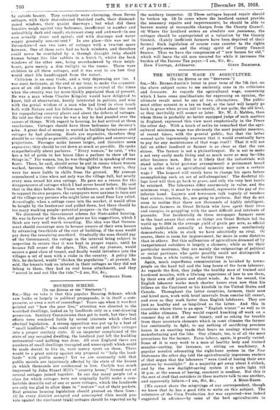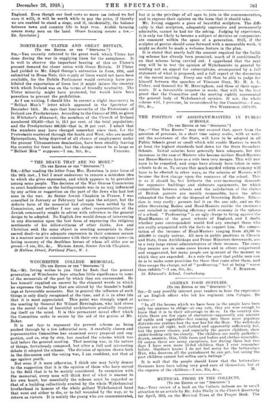THE MINIMUM WAGE I N AGRICULTURE. [To THE EDITOR OF THE
"SPECTATOR."] Si,—Mr. Barnes-Austin's letter in your issue of the 7th inst. on the above subject seems to me eminently sane in its criticisms and forecasts. As regards the agricultural wage, concerning which I have some qualifications for expressing an opinion, the ultimate result must be one of two alternatives. The publics must either consent to a tax on food, or the land will largely go back to grass when prices fall to nearly, if not quite, the old level, as they inevitably will sooner or later. Mr. W. J. Malden, than -whom there is probably no better equipped judge of such matters in England, expressed this view most emphatically in the Times the other day. With a touch of satire he remarked that the agri- cultural minimum wage was obviously the most popular measure, of recent times, with the general public, but that the latter seemed quite ingenuously unaware that it would eventually have to pay for any maintenance of that wage itself! That it will not fall on either landlord or farmer is as clear as that the sun shines. The farmer is not a philanthropist. He is out to mako a not very easily made living and as much more as may be—like other business men. But is it likely that the industrials will stand (after a brief post-war arrangement) a permanent bread tax in order that an agricultural minority may earn a certain wage ? The leopard will surely have to change his spots before aecomplishing such an act of self-abnegation! The doubtful til- lage land will then go back to grass, and only the very best hands be retained. The labourers differ enormously in value, and the minimum wage, it must be remembered, represents the pay of the inferior hand. Laymen and townsmen talk vaguely of wonders that science, tractors, &c., are going to perform. But they do not seem to realize that there are thousands of highly intelligent, first-class farmers in Great Britain who have spent their lives and energies in grappling with the most difficult and intricate of pursuits. Nor incidentally do these newspaper farmers seem. in the least aware that even as things are Great Britain led the world up to 1914 in the average yield of grain per acre, as official tables published annually at fourpence apiece conclusively demonstrate; while in stock we have admittedly no rival. Of course, there is room for improvement, far more in some districts than in others. But this millennium of agriculture dreamed of Ey inexperienced outsiders is largely a chimera; while as for their particular nostrums, they are mainly the outpourings of political or social partisans who quite possibly could not distinguish a swede from a white turnip, or barley from rye.
Again, much superfluous commiseration is lavished by towns- people on the hard toil and the long hours of the farm labourer. As regards the first, they judge the healthy man of trained and hardened muscles, with a life-long experience of how to use them, by their own stiff joints and short winds. As to the second, the English labourer works much shorter hours even now than his fellows on the Continent or his kinsfolk in the United States and Canada. Throughout the latter countries, farmers, their eons and hired men, work with brief intervals from sunrise till sunset, and even so they work faster than English labdurers. They are just as healthy and its long-lived as the latter. And this in countries where there is an open "English winter" as well as in the colder climates. They would regard knocking off work on a summer day at 4.30 as sheer lunacy, and as asking for trouble from those uncertain elements which in most climates the farmer has continually to -fight, to say nothing of sacrificing precious hours in an exacting trade that bears no analogy whatever to manufacturing and the like. Our climate, too, is of all the most precarious for the farmer. Farm labour, again, is greatly varied. Some of it is easy work to a man of healthy body and trained muscles—carting, for instance, or sitting on machinery. A popular novelist advocating the eight-hour system in the New Statesman the other day told the agriculturally ingenuous readers of that organ that the labourers "were tired of hoeing their own potatoes by moonlight." As a majority get away about 5 o'clock, and by the new daylight-saving system it is quite light till 10 p.m. at the season of hoeing, comment is needless. But this is the eort of stuff that outsiders in these matters talk to one another, and apparently believe.—I am, Sir, dic., A MOON-RAKER.
[We cannot share the misgivings of our correspondent, though we know that he has a good title to write on this subject. The substance of tho Corn Production Act was approved—was indeed suggested in advance—by some of the best agriculturists in
England. Even though our food costs us more (as indeed we feel sure it will), it will be worth while to pay the price, if thereby we are enabled to stand a siege, and if, incidentally, the balance between town and country life is kept true. Arable farming means many men on the land. Grass farming means a few.— En. Spectator.]



























 Previous page
Previous page